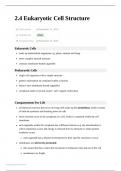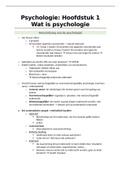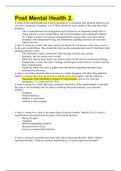Assess the view that ethical language is essentially emotive (12).
Ethical language focuses on the language we use to express morality, rather than trying to distinguish
between what is right and wrong like normative ethics. It can be divided into two sub-categories
known as cognitivism and non-cognitivism. Cognitivism aims to describe reality with the idea that
there are some absolute moral truths, whereas non-cognitivism argues that moral statements are
neither true nor false.
Problems caused by cognitivism have led to the belief that ethical language is better understood
emotively which is a theory of non-cognitivism. This looks at Ayer’s idea that moral judgments express
approval or disapproval, which is also why it is coined colloquially as the Boo-Hurrah theory. When
emotivists use ethical language, they are not judging morality or making normative truth claims; they
are simply expressing emotions. For example, when we say ‘murder is wrong’, we are not saying that
it is immoral like cognitivists would, but rather that we disapprove or dislike the idea. This avoids the
problem of creating a naturalistic fallacy like cognitivism does because we don’t attach properties to
words. Moreover, it is worth considering that perhaps we say ‘murder is wrong’ because of the
emotional response we receive from the action, rather than it being innate knowledge that it is
deemed immoral. Would it be deemed moral if humans did not react to it? Arguably it would still be
immoral because of the influence religion has had on society (it is one of the ten commandments), but
it is interesting to consider if this would still be the case had it not. Stevenson develops Ayer’s idea
and argues that ethical language is reciprocal; when we say ‘murder is wrong’, we expect people to
agree because of our emotional response. In this sense, ethical language is to some extent emotive
because it is clear to see that our emotions can influence our opinions and values on morality.
However, it is hard to comment on whether it can be truly emotive when religion has had such an
effect on society, that it has ingrained some absolute moral truths in us, perhaps even subconsciously.
Hume also makes a convincing argument about why ethical language has to be emotive and therefore
cannot be cognitivist. He comments on the ‘is-ought gap’ which claims that just because something is,
doesn't mean it ought to be. This acts as evidence for non-cognitivism because the reason we cannot
derive an ‘ought’ statement from an ‘is’ statement is because the former type of statement is
non-cognitive, whilst the latter is cognitive. ‘Is’ statements come from facts or claims, but ‘ought’
statements come from our emotions. This shows how ethical language is very much emotive because
we allow our emotions to control how we respond morally to a situation. For example, the ‘is’
statement such as “she was murdered” is capable of being true or false (cognitive), whereas the
‘ought’ statement such as “she should not have been murdered” comes from our emotional response
(non-cognitive). A problem of emotivism however, is that it could lead to the idea that there is no
rational justification for objective moral truths, and thus ethical language is entirely subjective. If this is
the case, then it leaves no room for ethical development because if two people have opposing views,
then it would just be accepted rather than challenged.
In conclusion, I would argue that ethical language is to some extent emotive due to Hume’s ‘is-ought
gap’ idea because it highlights how we can have both a cognitive and non-cognitive response to
ethical dilemmas; they work together to provide us with an ethical approach to a situation. I do
however think it is worth taking into consideration, the influence religion has had on society and that
they may have subconsciously ingrained key moral ideas within us, thus displaying elements of
cognitivism.
Ethical language focuses on the language we use to express morality, rather than trying to distinguish
between what is right and wrong like normative ethics. It can be divided into two sub-categories
known as cognitivism and non-cognitivism. Cognitivism aims to describe reality with the idea that
there are some absolute moral truths, whereas non-cognitivism argues that moral statements are
neither true nor false.
Problems caused by cognitivism have led to the belief that ethical language is better understood
emotively which is a theory of non-cognitivism. This looks at Ayer’s idea that moral judgments express
approval or disapproval, which is also why it is coined colloquially as the Boo-Hurrah theory. When
emotivists use ethical language, they are not judging morality or making normative truth claims; they
are simply expressing emotions. For example, when we say ‘murder is wrong’, we are not saying that
it is immoral like cognitivists would, but rather that we disapprove or dislike the idea. This avoids the
problem of creating a naturalistic fallacy like cognitivism does because we don’t attach properties to
words. Moreover, it is worth considering that perhaps we say ‘murder is wrong’ because of the
emotional response we receive from the action, rather than it being innate knowledge that it is
deemed immoral. Would it be deemed moral if humans did not react to it? Arguably it would still be
immoral because of the influence religion has had on society (it is one of the ten commandments), but
it is interesting to consider if this would still be the case had it not. Stevenson develops Ayer’s idea
and argues that ethical language is reciprocal; when we say ‘murder is wrong’, we expect people to
agree because of our emotional response. In this sense, ethical language is to some extent emotive
because it is clear to see that our emotions can influence our opinions and values on morality.
However, it is hard to comment on whether it can be truly emotive when religion has had such an
effect on society, that it has ingrained some absolute moral truths in us, perhaps even subconsciously.
Hume also makes a convincing argument about why ethical language has to be emotive and therefore
cannot be cognitivist. He comments on the ‘is-ought gap’ which claims that just because something is,
doesn't mean it ought to be. This acts as evidence for non-cognitivism because the reason we cannot
derive an ‘ought’ statement from an ‘is’ statement is because the former type of statement is
non-cognitive, whilst the latter is cognitive. ‘Is’ statements come from facts or claims, but ‘ought’
statements come from our emotions. This shows how ethical language is very much emotive because
we allow our emotions to control how we respond morally to a situation. For example, the ‘is’
statement such as “she was murdered” is capable of being true or false (cognitive), whereas the
‘ought’ statement such as “she should not have been murdered” comes from our emotional response
(non-cognitive). A problem of emotivism however, is that it could lead to the idea that there is no
rational justification for objective moral truths, and thus ethical language is entirely subjective. If this is
the case, then it leaves no room for ethical development because if two people have opposing views,
then it would just be accepted rather than challenged.
In conclusion, I would argue that ethical language is to some extent emotive due to Hume’s ‘is-ought
gap’ idea because it highlights how we can have both a cognitive and non-cognitive response to
ethical dilemmas; they work together to provide us with an ethical approach to a situation. I do
however think it is worth taking into consideration, the influence religion has had on society and that
they may have subconsciously ingrained key moral ideas within us, thus displaying elements of
cognitivism.




